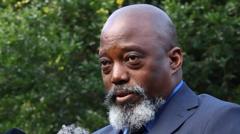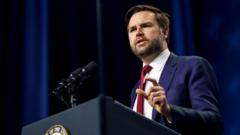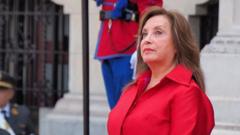Voters in Germany have chosen a new chancellor, marking a pivotal moment in the country's political landscape.
New Leadership in Germany: What the Future Holds

New Leadership in Germany: What the Future Holds
Germany's recent election marks a significant shift in power dynamics and political direction that echoes throughout Europe.
In Germany's parliamentary elections held on February 24, 2025, citizens turned out in record numbers, signaling a demand for change and a rejection of previous governing strategies. Here's a closer look at the key outcomes and implications of this highly anticipated election.
Friedrich Merz and his center-right Christian Democratic Union (CDU) coalition emerged victorious, pushing him closer to the chancellorship he has long sought. The election saw the CDU and its sister party, the Christian Social Union (CSU), reclaim a dominant position after years of losses. This shift is largely attributed to public dissatisfaction with the legacy of former Chancellor Angela Merkel, particularly regarding her administration's handling of immigration and energy policies.
This election’s results signify a critical point for Germany as a potential end to the previous coalition government's tumultuous tenure. Merz successfully campaigned on economic rejuvenation, promising tax cuts and regulatory reforms aimed at spurring growth, thus resonating with a populace eager for a revitalized economy.
In other electoral developments, efforts made by the Trump administration to sway German voters seemingly fell flat, illustrating the complexities of transatlantic influences on domestic elections. Additionally, the discourse surrounding migration policies, especially in light of recent refugee crises, has taken center stage in voter considerations.
As the dust settles, the prospect of governance under Merz raises questions about party stability and potential future coalitions. Will Germany embrace another three-party government, or are the winds shifting back to a more traditional two-party governance model? For now, uncertainty looms, but one thing is clear: the electoral result will have significant implications not just for Germany, but for the musical chairs of European politics at large.
With an eye on emerging policies and reforms promised by Merz's administration, citizens across Europe will be closely watching how this new leadership unfolds.
Friedrich Merz and his center-right Christian Democratic Union (CDU) coalition emerged victorious, pushing him closer to the chancellorship he has long sought. The election saw the CDU and its sister party, the Christian Social Union (CSU), reclaim a dominant position after years of losses. This shift is largely attributed to public dissatisfaction with the legacy of former Chancellor Angela Merkel, particularly regarding her administration's handling of immigration and energy policies.
This election’s results signify a critical point for Germany as a potential end to the previous coalition government's tumultuous tenure. Merz successfully campaigned on economic rejuvenation, promising tax cuts and regulatory reforms aimed at spurring growth, thus resonating with a populace eager for a revitalized economy.
In other electoral developments, efforts made by the Trump administration to sway German voters seemingly fell flat, illustrating the complexities of transatlantic influences on domestic elections. Additionally, the discourse surrounding migration policies, especially in light of recent refugee crises, has taken center stage in voter considerations.
As the dust settles, the prospect of governance under Merz raises questions about party stability and potential future coalitions. Will Germany embrace another three-party government, or are the winds shifting back to a more traditional two-party governance model? For now, uncertainty looms, but one thing is clear: the electoral result will have significant implications not just for Germany, but for the musical chairs of European politics at large.
With an eye on emerging policies and reforms promised by Merz's administration, citizens across Europe will be closely watching how this new leadership unfolds.






















